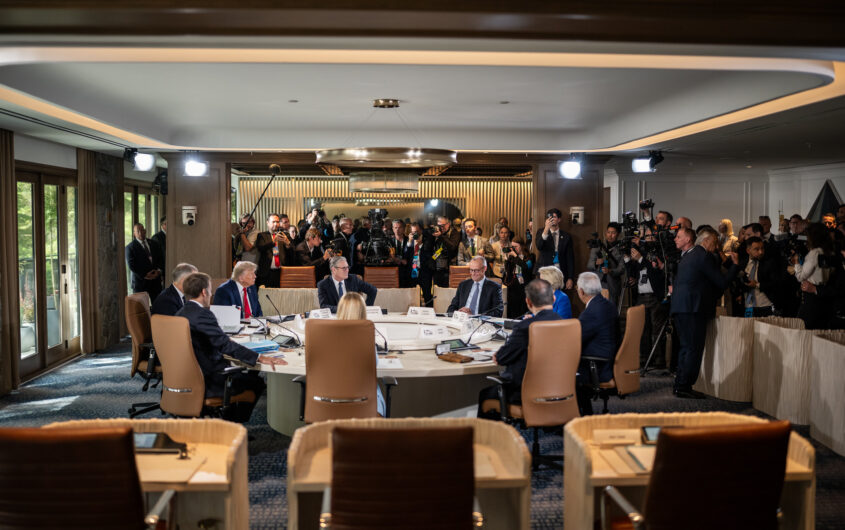
Official White House Photo by Daniel Torok via Flickr
Merz Bridges G7 Disputes, Eyes NATO

Katharina Schindel
Halle Foundation/AGI Intern
Katharina Schindel is a summer 2025 Halle Foundation Intern at the American-German Institute. She is a rising second year graduate student in the European Studies program at Georgetown University’s School of Foreign Service, pursuing a concentration in international business and transatlantic diplomacy. Originally from Munich, Germany, Katharina earned her BA in political science and sociology from Ludwig-Maximilians-Universität (LMU), where she focused on EU-U.S. relations, and holds a certificate in U.S. politics from American University’s Washington Semester Program.
Prior to her graduate studies at Georgetown, Katharina worked as a project assistant for the Public Affairs Consultancy APCO Worldwide in Munich, where she provided geopolitical risk analysis for international clients in the tech and security space and supported high-profile political events, such as the Munich Security Conference. In addition, Katharina has further experience in transatlantic policy engagement, having previously served as a fellow at the Friedrich Ebert Foundation in Washington, DC.
Her research interests include the security sphere of the transatlantic relationship (specifically as it pertains to Germany and the United States) and shared issues on the emerging tech frontier for both sides of the Atlantic.

Zane Davis
Halle Foundation/AGI Intern
Zane Davis is a summer 2025 Halle Foundation Intern at the American-German Institute. His primary research interests include artificial intelligence policy, labor economics, and global trade.
Prior to joining AGI, Zane completed his bachelor's degree in economics from the University of North Carolina at Chapel Hill, where he also earned minors in German and philosophy. He developed an interest in artificial intelligence and global trade while working for a Munich-based software startup in 2022. In 2023, he relocated to Germany, where he played American football for the Ingolstadt Dukes of the German Football League. Since then, he has worked for organizations spanning the United States, Korea, and Thailand, strengthening his background in public policy and international affairs.
In the fall of 2025, he will return to Chapel Hill to begin the Master of Public Administration program at the UNC School of Government.
The 2025 G7 Summit in Kananaskis, Canada, opened under the weight of low expectations and closed under the shadow of deepening transatlantic fault lines. The headlines surrounding the summit were largely defined by the early departure of U.S. President Donald Trump, who left a day early to manage the escalating conflict between Israel and Iran. His premature exit effectively scuttled the primary objective for German and other European leaders: securing a unified G7 commitment for stronger sanctions against Russia and support for Ukraine. In the face of this setback, German Chancellor Friedrich Merz offered optimism to the press, publicly framing the summit as a success and the atmosphere as collegial and without confrontation. By pivoting to champion the G7’s joint statement on Iran and a suite of smaller technical agreements, Merz’s performance at the summit highlighted a clear European strategy for navigating this new era of transatlantic relations. This approach of public conciliation and carefully managed expectations reveals an alliance grappling with an increasingly unstable relationship as American and German leaders attempt to salvage unity wherever it can be found.
Expectations
Expectations of the G7 Summit in Kananaskis, Canada, were tempered by a mix of anticipation and uncertainty. With President Trump returning to the table, the gathering was widely expected to take on a “G6 plus 1” dynamic, highlighting the extent to which the United States had drifted from its traditional allies. Leaders proved friendly in public, but beneath the carefully scripted talking points and cordial words exchanged ahead of the official summit start, officials braced for deep disagreements on virtually every front—from the war in Ukraine and the future of global trade to the digital economy and climate action.
A fundamental clash of priorities set the stage: European nations focused on securing unified support for Ukraine and resolving trade disputes, while the Trump administration prioritized strategic competition with China. This core rift extended to the strategy on Ukraine, as Washington’s preference for a resolution involving significant Ukrainian concessions alarmed European leaders who view the war as an existential threat to their security. While analysis ahead of the summit suggested that common ground might be found on issues such as sanctions against China and North Korea, the broader mood already hinted at an alliance under stress.
The summit convened under the shadow of a newly reignited conflict between Iran and Israel. Speaking before his departure to Canada, German Chancellor Friedrich Merz articulated a firm position, stating, “Israel has the right to defend its existence and the security of its citizens,” and calling Iran’s nuclear program an “existential threat to Israel.” In stark contrast, President Trump offered a more ambiguous take, telling reporters, “I hope there’s going to be a deal… Sometimes they have to fight it out, but we’re gonna see what happens.”
Against this backdrop, the prospect of a comprehensive final communiqué was largely dismissed, with host nation Canada instead aiming for several smaller statements on less controversial topics. Chancellor Merz’s public stance mirrored this pragmatism, as he sought to project European unity while carefully managing expectations on contentious topics. He expressed optimism for a joint statement on Iran but cautioned on trade that only “small steps toward a solution” were likely, scheduling separate bilateral meetings with the leaders of India, Ukraine, and South Africa to advance key objectives.
Joint Statements, Despite Trump’s Departure
On Monday afternoon local time, Trump announced that he would be leaving the summit early due to the escalating conflict in the Middle East. Despite his early departure, the G7 managed to release a series of joint statements—seven in total—by the summit’s close. This marked a notable, if fragile, show of unity among the world’s leading economies. Yet conspicuously absent from the suite of declarations was a joint agreement on further sanctions on Russia or new commitments to Ukraine. This omission, noted with careful language in the Chair’s Summary, underscored the persisting divergence in views on the U.S. role in European security.
Instead, the most consequential statement to come out of the meetings addressed the Israel-Iran conflict. Titled “G7 Leaders’ statement on recent developments between Israel and Iran,” the document underscores Israel’s right to self-defense and clearly designates Iran as the principal source of regional instability in the Middle East. The statement reasserted that “Iran can never have a nuclear weapon” and emphasized the importance of protecting civilians and seeking broader de-escalation, including in Gaza.
Speaking to German media broadcaster ZDF on Tuesday afternoon, Chancellor Merz admitted that when he arrived in Canada that he “was not sure if we would come to a common agreement“ on Iran. President Trump initially declined to sign the G-7’s statement but reversed his position following discussions with other leaders in the group and changes to the initial draft, according to a U.S. official. The fact that all seven nations were able to come to an agreement was, by Chancellor Merz’s account, an achievement in itself that has left him “very content.”
Merz has since championed the Iran statement as a sign of G7 cohesion on security matters, highlighting the agreement as a diplomatic success. At his post-summit press conference, he emphasized that “we’ve given unanimous statements on all seven topics we discussed,” with Monday’s statement on Iran having been a top priority. The chancellor repeatedly made it a point to characterize the talks as “very collegial, very open, and at no point, anywhere, controversial or confrontational,” a tone meant to signal steadiness at this tenuous moment for the transatlantic relationship.
Merz’s performance at the summit highlighted a clear European strategy for navigating this new era of transatlantic relations.
Still, some of Merz’s more inflammatory remarks to the media have caused a stir.[1] In an interview with ZDF during the summit, the German chancellor referred to Israel’s military actions against Iran as “Drecksarbeit” (“dirty work”), framing it as a necessary response to Tehran’s nuclear ambitions. “I have great respect for the bravery of the Israeli leadership,” he stated, refusing to characterize Israel’s strikes as a “war of aggression” and adding that if the Israeli government deemed the threat imminent, he had “no grounds on which to contradict them.” He went further, remarking that “it would be a good thing if this regime [in Iran] came to an end,” walking a tightrope between endorsing regime change and denying that Germany would play an active role beyond offering firefighting supplies and diplomatic pressure. Now, other leaders are being drawn into the controversy, with Italian Prime Minister Giorgia Meloni and UK Prime Minister Keir Starmer facing questions about Merz’s rhetoric; both offered diplomatic, noncommittal responses.
The summit also revealed a new and potentially damaging fissure within Europe itself. The stark contrast between French President Macron’s explicit rejection of regime change in Iran and German Chancellor Merz’s more ambiguous and supportive stance of Israel on the matter hints at a fundamental disagreement over policy toward Israel and Iran that could become a significant point of tension at the NATO summit this week, especially following the United States’ targeted bombing raids against Iranian nuclear facilities at Fordow, Natanz, and Isfahan. Following the attacks, President Trump showed openness to regime change on Truth Social, asking, “… why wouldn’t there be a Regime change?” Chancellor Merz’s bilateral meeting with President Trump at the G7 reportedly included a long conversation on the issue, with Merz later downplaying any tension.
The remaining G7 statements focused on less divisive terrain: accelerating responsible AI development, strengthening supply chains for critical minerals, coordinating wildfire preparedness, advancing quantum technology, countering migrant smuggling, and addressing transnational repression. Each offered a technically ambitious but politically safe agenda, with Canada’s prime minister clearly prioritizing deliverables that could avoid a further fracture of the group and portray a united front.
Ukraine and Sanctions Discussion
Donald Trump’s early departure spelled disappointment for European leaders, who had hoped to use the summit’s second day to convince him to support tougher sanctions against Russia. European leaders entered the summit with the primary objective of securing unified G7 backing for Ukraine, which they view as a critical matter of national and regional security. Their agenda included pressing for a lower price cap on Russian oil and gaining U.S. support for the EU’s eighteenth sanctions package. In the aftermath, Chancellor Friedrich Merz downplayed the setback, publicly voicing “cautious optimism” that the United States might still enact further sanctions on Russia.
Despite the clear blow to Europe’s agenda and diplomatic efforts, Merz insisted that Trump’s physical absence from the final day’s talks was not “a restriction on our efforts to help“ Ukraine. He emphasized U.S. Treasury Secretary Scott Bessent’s continued presence as a positive signal, calling him an “even more important figure than the U.S. president himself” on the topic of sanctions and noting that Trump constantly asks Bessent for advice. The chancellor stressed that Europe would continue to explore “all options“ to bring Moscow to the negotiating table, including military support and sanctions. The issue of Western unity has been pushed to the NATO Summit in The Hague next week.
On Trade and Tariffs
Chancellor Merz downplayed the prospects of reaching a trade agreement with the United States, stating in an interview that, “There will not be a solution [to tariffs] at this summit, but we may be able to take some small steps towards a solution.” In his interviews during and after the summit, Merz was quick to frame the outcome as a modest success, repeatedly referring to the recent U.S.-UK trade agreement as a framework for an eventual U.S.-EU agreement. Chancellor Merz conveyed tempered optimism following his meetings with the U.S. delegation, suggesting a deal before the July 9 deadline was possible.
This effort to cast trade talks in a positive light was reinforced by European Commission President Ursula von der Leyen, who struck a remarkably conciliatory tone toward President Trump. In a statement to the G7, she agreed with President Trump that the current world trading system has a “serious problem,” but framed the issue as one caused by China’s market-distorting practices and not by G7 member-states. Other European leaders (including Merz and Macron) followed suit, lamenting China’s behavior in global markets in their closing remarks. With Trump repeating the claim on his flight back to Washington that the EU was “formed in order to hurt the U.S. on trade,” the EU seems to be betting that subtly redirecting the narrative toward China as a common adversary may create space for a more favorable agreement.
All Eyes on NATO
Overall, Merz has praised the 2025 G7 as a “significantly more successful summit than anticipated,” despite no joint statement on Ukraine. He praised the G7’s cohesion but even his conciliatory tone could not mask the creeping divergence among leaders on Iran. While French President Emmanuel Macron warned that “the biggest mistake today would be to try to do a regime change,” Merz was supportive: “There are also good examples [of regime change].”
Looking ahead to this week’s NATO Summit, Merz’s more hawkish approach to the Middle East and growing intra-European tensions could present a barrier to NATO cooperation on support for Ukraine. What actually happens will depend in large part on how the situation in the Middle East develops. Now, with Ukraine left waiting for the NATO Summit in The Hague this week and the United States’ reticence once again on display, the coming days will test whether Europe’s strategy of calculated appeasement can hold water. For now, the G7 leaves more questions than answers in its wake.
[1] The phrase also caused a stir domestically. Adis Ahmetović, foreign affairs spokesman for the SPD parliamentary group, criticized Friedrich Merz (CDU) for his “dirty work” statement on Israel’s role in Iran. Ahmetović told ZDFheute, “This choice of words has caused irritation in the SPD parliamentary group. The chancellor’s tone is not very effective at this point.”








